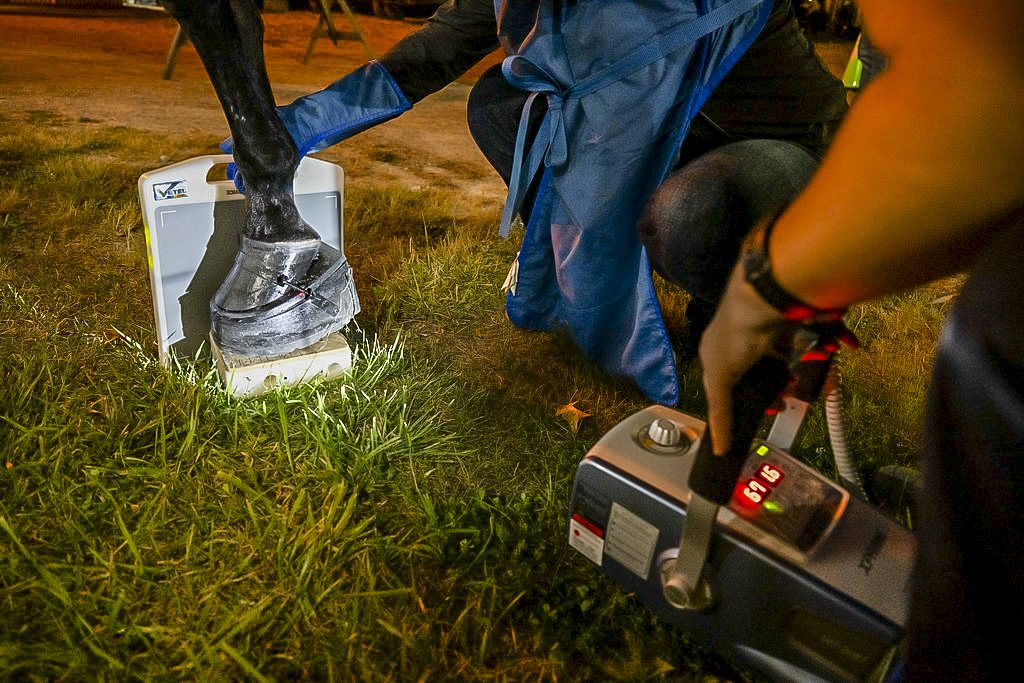UPDATE: A link to new Horse Protection Act rule added in the second paragraph.
Promising an end to horse soring, the United States Department of Agriculture’s (USDA) Animal and Plant Health Inspection Service (APHIS) announces amendments to the Horse Protection Act that will not only fundamentally change Tennessee Walking Horse shows and how mounts are shod, but all shows regardless of breed and discipline.
Although the Horse Protection Act (HPA) applies to all breeds and disciplines since its inception in 1970, enforcement historically targets the elimination of soring in Tennessee Walkers, Spotted Saddle Horses and racking horses, federal regulations are focusing on all shows, exhibitions, sales and auctions. The new rule defines a show as a public display of any horses in competition except where speed is the prime factor, rodeo events, parades, or trail rides.
The rule, which goes into effect Feb. 1, 2025, requires horse show and event managers to:
- Notify APHIS at least 30 days before an event via mail or email.
- Update APHIS about any changes 15 days before an event.
- Report HPA violations within 5 days after an event.
An End to Soring?
Often considered the smoothest ride, Tennessee Walking Horses have a naturally high, four-beat running walk that’s coveted in show rings. Soring is the intentional application of substances or devices to horses’ limbs to inflict pain to exaggerate the high-stepping gait, known as The Big Lick.
“For far too long, some within the Tennessee Walking Horse industry have sored and abused their horses, despite the industry’s inspection process and our own enforcement efforts,” says Jenny Lester-Moffitt, undersecretary for USDA Marketing and Regulatory Programs. “This abuse must stop. Eliminating this cruel practice will help protect horses competing in these shows and level the playing field for the industry. The independent inspection process should strengthen the competition at these shows and benefit the many owners and trainers who do right by their animals.”
The Tennessee Walking Horse industry is considering its options.
“Industry leadership and legal counsel will be reviewing the final rule and its contents before commenting further on next steps,” according to The Walking Horse Report.
However, it was clear that if the Aug. 21, 2023, proposed rule remained the same, a legal challenge was likely.
“The rule did come back from OMB with a status, ‘Consistent with Change,’ meaning OMB did recommend some change to the rule,” according to The Walking Horse Report. “However, the expectation is that the final rule will contain most, if not all, of what was included in the proposed rule. If those changes are not made, the industry will continue on its stated path of challenging the rule in U.S. District Court. As part of that process, it may be necessary for the industry to seek a stay on the effective date of the rule until the District Court renders a decision.”
Shoeing Changes
Many of the proposed rule changes are similar to those proposed in the 2017 APHIS rule and the Prevent All Soring Tactics (PAST) Act that both houses of Congress have put forth over the past several years. The rule prohibits “any device, method, practice, or substance applied to any horse that could hide or mask evidence of soring, as well as all action devices and non-therapeutic pads and wedges, and substances applied about the hoof.”
While the current regulation prohibits pads or other devices on yearling horses that elevate or change the angle more than 1 inch at the heel, the new rule eliminates all pads unless they are applied for therapeutic purposes.
“Altering the angulation of a horse’s feet and legs can cause painful lameness, soreness, and inflammation by transferring concussive impact and weight-bearing pressures to joints and other parts of the horse not normally subjected to these forces,” states the rule. “Elevating the foot using stacked hoof pads, or ‘performance packages,’ can also cause an increase in tension in the tendons leading to inflammation, as can extra weight on the horse’s foot.”
Citing an Auburn University study, the rule also makes the case that raising heels with only pads results in swollen flexor tendons and inflammation. The packages limit the ability to detect pressure soring since the solar surface of the foot is covered. Pressure soring involves the use of items such as bolts, screws, hoof packing and other materials to create force on the sole to influence the horse’s gait.
Action devices are defined as “any boot, collar, chain, roller, beads, bangles, or other devices, which encircles or is placed upon the lower extremity of the leg or slide up and down the leg so as to cause friction, or which can strike the hoof, coronet band or fetlock joint.”
The rule also prohibits all artificial toe length extensions unless it has been prescribed and receiving therapeutic treatment.
“Toe extensions can be used to sore horses by increasing stress on certain tendons and ligaments,” the rule states.
In addition, the rule also:
- Prohibits grinding or trimming the sole of the hoof to expose spongy, sensitive tissues underneath the sole.
- Prohibits the removal or trimming of normal support structures of the hoof wall. Removing the support causes the sole to bear all of the weight. This is called “rolling the sole.”
- Eliminates industry self-regulation and Designated Qualified Persons as inspectors. Authority to inspect horses at shows, exhibitions, sales and auctions will fall to “APHIS inspectors and independent non-APHIS-employed protection inspectors.” They will be screened, trained and authorized by APHIS.
- Removes the scar rule and replaces it with “a more accurate description of visible dermatological changes indicative of soring.
The 2017 rule was set to amend the HPA in the waning days of the Obama administration; however, officials failed to publish it in the Federal Register before the end of the president’s term. The Trump administration withdrew all unpublished rules and returned them to the relevant agencies for review. The final rule was not resurrected. However, the Circuit Court of Appeals for the District of Columbia found the withdrawal illegal. The court found that APHIS could propose the withdrawal, and publish it in the Federal Register with a public comment period. APHIS concluded the comment period Aug. 22, 2023. APHIS’ withdrawal was, in part, because its proposed rule incorporates new information and research, including from “Review of Methods for Detecting Soreness in Horses,” published by the National Academies of Science in 2021.
Although the rule is similar to the PAST Acts that await debate and votes in both houses of Congress, it is not congressionally passed legislation signed into law by the president. Rather, the Biden administration created the rule and put it into effect, thus avoiding Congress.








